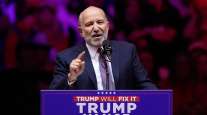Trump Administration to Hold Off on Car Tariffs After Trade Meeting

The Trump administration will hold off for now on imposing new tariffs on automobile imports as top officials weigh revisions to a report on the national security implications, according to two people familiar with the matter.
President Donald Trump met with his top trade advisers Nov. 13 at the White House to discuss a draft report on a Commerce Department investigation into the impact of car imports. The people, who spoke on condition of anonymity because the meeting wasn’t publicly announced, said the administration wasn’t ready to act on tariffs and that the report would be subject to further changes.
The Commerce probe, which began in May under section 232 of the Trade Expansion Act, covers imports of automobiles, including SUVs, vans and light trucks, as well as auto parts. Commerce Secretary Wilbur Ross has until February to deliver his findings to the president, who has final say on any tariffs. Trump has threatened tariffs of as much as 25% on foreign-made vehicles.
Companies and governments from Europe to Asia have warned Trump that tariffs on car imports would hurt the U.S. economy and disrupt the global auto industry.

Commerce Secretary Wilbur Ross (Andrew Harrer/Bloomberg News)
An auto trade war would deal a blow to car-makers from General Motors Co. to Toyota Motor Corp., which have built their supply chains to take advantage of countries with low duties. The National Automobile Dealers Association estimates that the tariffs would add as much as $2,270 to the cost of U.S.-built cars and $6,875 to the cost of imported cars and trucks.
Trump has 90 days after officially receiving the report to decide whether to act should the department conclude that auto imports are a security threat. Commerce could recommend a variety of options to restrict imports, including implementing tariffs and quotas. The president then has 15 days to act after announcing he will move forward with measures.
Trump has agreed not to impose auto tariffs on Europe while the two sides work on a trade deal, and Canada and Mexico negotiated side letters to the new U.S.-Mexico-Canada Agreement that spares them from new U.S. duties on cars, subject to a cap.
European Union Trade Commissioner Cecilia Malmstrom said Nov. 13 that Europe expects to be exempted from any new U.S. automobile tariffs, at least temporarily.
“We are under the assumption that is still valid,” Malmstrom said, referring to a pledge made by the U.S. and EU in July not to impose new tariffs on each other. She is in Washington this week to meet with Lighthizer.
Malmstrom said there may be enough common ground for a “limited” trade agreement between the U.S. and EU over industrial goods that excludes vehicles, agriculture and liquefied natural gas. The Trump administration said in September it wanted to reach a formal trade agreement with the EU.
The U.S. imported about $350 billion of cars and car parts last year.




